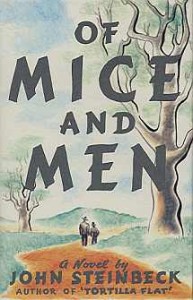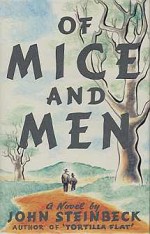I’m writing this paper while lying in a hospital bed in the Emergency Room at MedStar Mem orial Hospital, where I was sent this morning after consulting the doctor about my knee. It’s not an injury, she said, but an infection, which makes sense now I think about it. Let’s hope they don’t have to amputate. The guy in the next room has gangrene in his foot.
orial Hospital, where I was sent this morning after consulting the doctor about my knee. It’s not an injury, she said, but an infection, which makes sense now I think about it. Let’s hope they don’t have to amputate. The guy in the next room has gangrene in his foot.
Anyway, back to Of Mice and Men. I don’t know if I believe, as Mr. Gross does, that a book can be reduced to a single moral or message, but I know that’s what he wants from me. If I had to sum up a moral or message for the sake of argument, it would be “True loyalty means protecting your man at any cost, even the cost of his life.” By shooting Lennie in the back of the head, George is committing the supreme act of loyalty, because there’s no question that if he were found, Lenny would be shot on the spot by Curley in an act that would easily be defended after the murder of Lenny’s wife (and maybe this is the reason why Steinbeck never lets us get to know her well—if we knew her and sympathized with her, we might not have such sympathy with Lenny). I wonder if George will get away with his act with impunity, however. Slim understands and isn’t going to tell on him, but if anyone else found out what he’s done, wouldn’t he be arrested for murder? (George, after all, doesn’t have Curley’s privileges.) Lenny’s body may disappear into the swamp and never be found, but still, George may have to go on the run for a while.
Reading the book for the second time with the men made me see things I hadn’t seen before, including how carefully structured it is. I didn’t make the connection, the first time I read it, between the shooting of the old dog and George’s execution of Lenny. I think there’s no doubt that George does the right thing. He’s a good shot and Lenny doesn’t know what’s coming to him. He goes to his death thinking about his rabbit farm, and his death was no doubt instant. It’s difficult to imagine how George will get along without him. In some ways, I think an enormous burden will be lifted from his life. But he’ll probably miss having Lenny around, not least for the money Lenny could bring in. It’s difficult to imagine George being able to develop another friendship with a “normal” man. Whatever else you could say about him, Lenny was special.
In closing, I wouldn’t say I really enjoyed reading Of Mice and Men, or that I came to a new appreciation of Steinbeck, but I did get more out of it than I expected, and I can see there’s more going on beneath the surface, and within the structure, than I initially believed.
By the way, the doctor just came in and said I have a superficial infection under the skin and it’s probably nothing—all I need is a course of antibiotics and a bandage. I feel completely disappointed. I’m always hoping for something dramatic and morbid, even if it’s my own expense. Would I have preferred it if he’d come into the room with a shotgun and told me he had to put a bullet in the back of the head? Perhaps I would.
